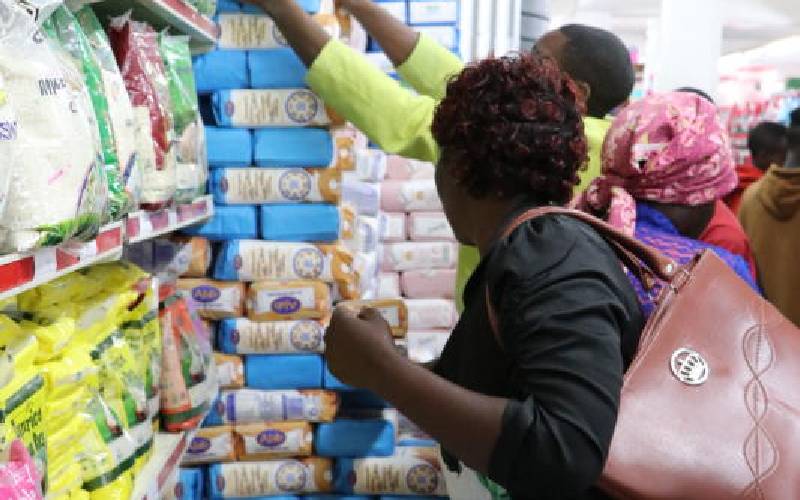Shoppers at Jamaa Supermarket in Olkalou town Nyandarua County Today as they shop for Christmas after arriving from Nairobi and other cities. Mourine Andisi, a resident of Nairobi’s Umoja Estate, had religiously been shopping at one of the big supermarkets in the country.
She would spend Sh8,000 monthly, content that the prices she paid for the items, mostly foodstuffs, were better than in other stores.
Then a friend introduced her to a new general store in the neighbourhood, ending her monthly trips to the big retailer. Read More
“I was able to save Sh2,000, which I used to spend on rice,” says Ms Andisi.
The owner of the store sources the cereal from a trusted trader in Mwea, Kirinyaga County.
She has also booted supermarkets as the preferred source of her daughter’s diapers.
She now buys them from any of the many baby shops that have mushroomed in her estate.
“Here (in baby shops), there are new, cheaper brands of diapers that are of good quality. You won’t find them in supermarkets,” says Andisi.
Her divorce from supermarkets, it seems, is now complete.
It dawned on her that while supermarkets rode on the fact that they were able to offer shoppers everything under one roof, general shops equally stock virtually all the items she bought from the retailers.
And the icing on the cake: these products are way cheaper.Andisi is among tens of thousands of middle-class Kenyans who, nudged by tough economic times, have aggressively been shopping for better prices and promotions.As a result, they have been moving away from supermarkets and going back to traditional traders.The onslaught on supermarkets is also coming from digital marketplaces. It is not just e-commerce giants like Jumia, Kilimall, Masoko, Avechi, and Skygarden that are snatching away convenience-loving customers from supermarkets.Many individual traders are also selling their products online.Patrick Kisia is among thousands of Kenyans who started selling groceries three months after covid-19 broke out, in what has been described as a wave of car-boot shops.“It has so far been my way of marketing… and from that I get referrals from my clients and family,” says Kisia, adding that he sometimes sells from the roadsides.His overhead costs include fuel, parking fees, county fees, and car maintenance, as he uses his vehicle for deliveries.With digital marketplaces, you can shop in several retail stores around the country and even the world.Everything is just a click away, although there is a lag in time of […]
